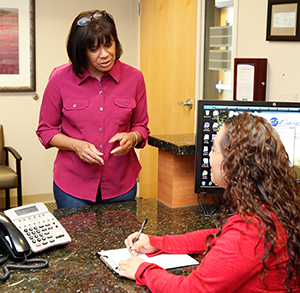Spinal Fusion: Recovery
If you’ve had neck surgery, expect recovery to take about 3 months. For lower back surgery, recovery can take 6 months to 1 year. To help protect your healing spine during this time, follow the guidelines below and any other directions you’ve been given.
Recovering in the hospital
After the surgery, you’ll go to the PACU (post-anesthesia care unit). After you're fully awake and stable, you’ll go to a regular hospital room:
-
When you first wake up from surgery, you may feel groggy, thirsty, or cold.
-
You may have tubes in your body to drain fluid from your incision. You may also have a tube called a urinary catheter to drain your bladder. These tubes are usually removed before you leave the hospital.
-
You’ll be encouraged to get up and walk. A healthcare provider will assist you.
-
Your IV (intravenous) line gives you fluids and nutrition until you can eat on your own, usually in 1 to 2 days.
-
You may wear special stockings or boots to prevent blood clots in your legs.
-
You may be given a neck collar or back brace depending on the location of your surgery.
-
You'll be given medicines to control the pain. These medicines can be given in your IV and taken orally. To go home, your pain must be controlled with oral medicines. Make sure to take stool softeners while taking any narcotic pain medicine to prevent constipation.
Recovering at home
Once you return home, here's what you can do:
-
Visits after surgery let your surgeon keep track of your healing and remove your stitches or staples. Be sure to keep your follow-up appointments.
-
Take a few short walks each day. Increase your walking time as you heal, as directed.
-
If you feel more pain than normal after an activity, you may have overdone it. Take it a little easier for a few hours.
-
Ask your surgeon what activities to avoid. Also ask when you can return to work, driving, and sex.
-
Keep your incision dressing dry and do not remove the dressing until your healthcare provider tells you to.
-
You may see a physical therapist who'll teach you how to move after surgery.
 |
| Keep all your follow-up appointments after your surgery. |
Managing your pain
In the hospital. Your nurse may give you your pain medicine. Or you may have a PCA (patient-controlled analgesia) pump. This lets you control your own pain medicine. If your pain makes you very uncomfortable, tell your nurse.
At home. Take your prescribed pain medicine as directed and on time. Don’t wait for the pain to get bad before you take your pain medicine. You may need this medicine for 1 to 3 weeks or longer. Ask your healthcare provider about using nonsteroidal anti-inflammatory drugs (NSAIDs) for pain control. There is some controversy about whether they slow the healing of spinal fusion. If you have diabetes, you'll be encouraged to control your blood sugar. Nicotine blocks new bone formation. So your provider will ask you not to smoke or use any nicotine products for 6 to 12 months.
Online Medical Reviewer:
Anne Fetterman RN BSN
Online Medical Reviewer:
Heather M Trevino BSN RNC
Online Medical Reviewer:
Mahammad Juber MD
Date Last Reviewed:
3/1/2024
© 2000-2024 The StayWell Company, LLC. All rights reserved. This information is not intended as a substitute for professional medical care. Always follow your healthcare professional's instructions.